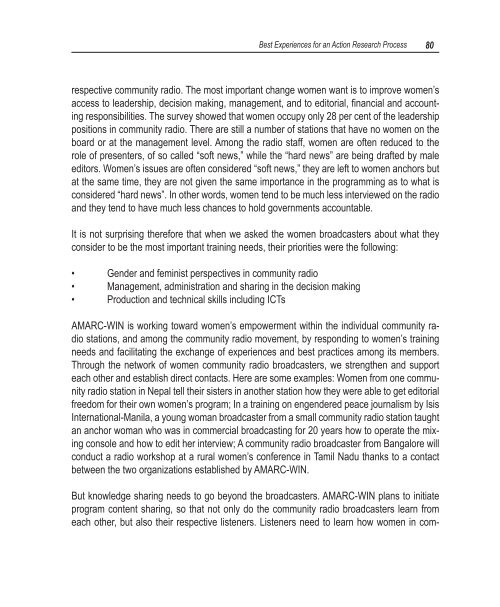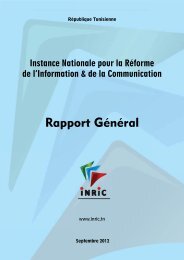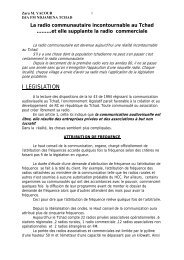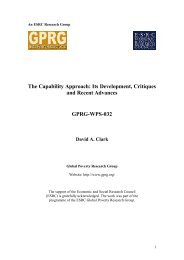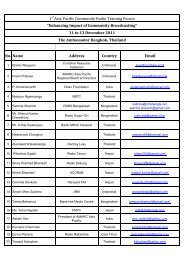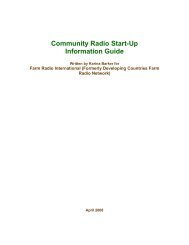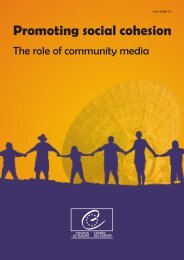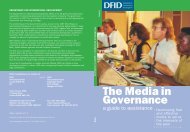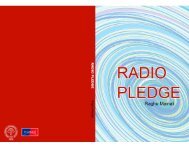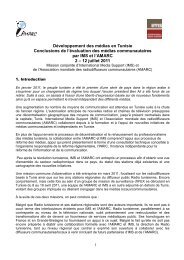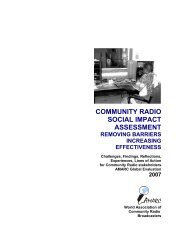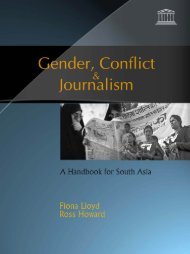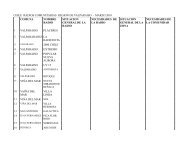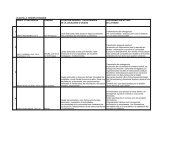Women's Empowerment and Good Governance Through - amarc
Women's Empowerment and Good Governance Through - amarc
Women's Empowerment and Good Governance Through - amarc
Create successful ePaper yourself
Turn your PDF publications into a flip-book with our unique Google optimized e-Paper software.
Best Experiences for an Action Research Process 80<br />
respective community radio. The most important change women want is to improve women’s<br />
access to leadership, decision making, management, <strong>and</strong> to editorial, financial <strong>and</strong> accounting<br />
responsibilities. The survey showed that women occupy only 28 per cent of the leadership<br />
positions in community radio. There are still a number of stations that have no women on the<br />
board or at the management level. Among the radio staff, women are often reduced to the<br />
role of presenters, of so called “soft news,” while the “hard news” are being drafted by male<br />
editors. Women’s issues are often considered “soft news,” they are left to women anchors but<br />
at the same time, they are not given the same importance in the programming as to what is<br />
considered “hard news”. In other words, women tend to be much less interviewed on the radio<br />
<strong>and</strong> they tend to have much less chances to hold governments accountable.<br />
It is not surprising therefore that when we asked the women broadcasters about what they<br />
consider to be the most important training needs, their priorities were the following:<br />
• Gender <strong>and</strong> feminist perspectives in community radio<br />
• Management, administration <strong>and</strong> sharing in the decision making<br />
• Production <strong>and</strong> technical skills including ICTs<br />
AMARC-WIN is working toward women’s empowerment within the individual community radio<br />
stations, <strong>and</strong> among the community radio movement, by responding to women’s training<br />
needs <strong>and</strong> facilitating the exchange of experiences <strong>and</strong> best practices among its members.<br />
<strong>Through</strong> the network of women community radio broadcasters, we strengthen <strong>and</strong> support<br />
each other <strong>and</strong> establish direct contacts. Here are some examples: Women from one community<br />
radio station in Nepal tell their sisters in another station how they were able to get editorial<br />
freedom for their own women’s program; In a training on engendered peace journalism by Isis<br />
International-Manila, a young woman broadcaster from a small community radio station taught<br />
an anchor woman who was in commercial broadcasting for 20 years how to operate the mixing<br />
console <strong>and</strong> how to edit her interview; A community radio broadcaster from Bangalore will<br />
conduct a radio workshop at a rural women’s conference in Tamil Nadu thanks to a contact<br />
between the two organizations established by AMARC-WIN.<br />
But knowledge sharing needs to go beyond the broadcasters. AMARC-WIN plans to initiate<br />
program content sharing, so that not only do the community radio broadcasters learn from<br />
each other, but also their respective listeners. Listeners need to learn how women in com-


